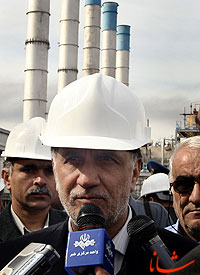Seyed Kazem Vaziri-Hamaneh, who made the statement in his visit to Isfahan Refinery, added, “To this end, the government has taken major strides toward the development of refineries.”
The minister expressed his satisfaction with the measures taken in Isfahan Refinery, adding the gasoline production units of the refinery were under construction by Namavaran Engineering Company with the aim of increasing its daily petrol output by three million liters.
He said the ceiling value of the contract with the company was 161 million euros and the refinery’s gasoline production would reach 12 million liters per day from the current nine million liters.
“To enforce the policies of the ninth government and oil sector, Isfahan Refinery has taken big steps toward attaining self-sufficiency,” said the ranking official.
The managing director Isfahan Refinery, for his part, said the refinery was as old as the Islamic Revolution and the country’s largest producer of oil products with a daily production capacity of 379 thousand barrels.
The refinery accounted for some 25 percent of domestic refineries’ output – 25 percent of gasoline, 27 percent of liquefied gas, 26 percent of kerosene, 24 percent of gas oil, and 18 percent of furnace oil.
President Mahmoud Ahmadinejad said
The president added, “Due to investments made to develop refineries, the country will turn to a gasoline exporter in case consumption keeps going.”
Ahmadinejad said the country was currently producing four million barrels of oil per day, of which 2.4 million barrels were exported and 1.6 million barrels were used in the country.
“We are also using 350 million cubic meters of gas daily,” said the president, calling the increasing use of fossil fuels the main problem the country faced.
The price of oil and gas consumed in the country per year was more than the revenue gained through oil exports, i.e. 55 billion dollars, he regretted.
He pointed to the clearance of beat-up vehicles, production of gas-fueled cars, and development of public transportation as the government’s measures to reduce the gasoline consumption.
Ahmadinejad predicted that the country would not need gasoline as of 2011.
He called gasoline rationing as a supplementary measure, underlining that the country was not able to spend 7 billion dollars for imports of gasoline and gas oil while a great volume of petrol was consumed in traffic jams and during unnecessary trips.
“We are trying to meet the public need in the gasoline rationing system,” he vowed.
The lavish consumption by Iranian drivers, encouraged by the subsidized prices that work out less than a comparable amount of mineral water, forces OPEC’s No. 2 producer to import billions of dollars of extra petrol annually.


Your Comment